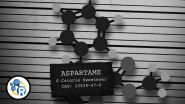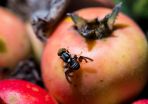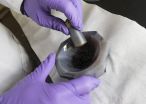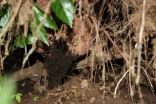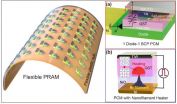INFORMATION:
Subscribe to the series at http://bit.ly/ACSReactions, and follow us on Twitter @ACSreactions to be the first to see our latest videos.
The American Chemical Society is a nonprofit organization chartered by the U.S. Congress. With more than 158,000 members, ACS is the world's largest scientific society and a global leader in providing access to chemistry-related research through its multiple databases, peer-reviewed journals and scientific conferences. Its main offices are in Washington, D.C., and Columbus, Ohio.
To automatically receive news releases from the American Chemical Society, contact newsroom@acs.org.
Follow us: Twitter Facebook
Is aspartame safe? (video)
2015-06-15
(Press-News.org) WASHINGTON, June 15, 2015 -- It's been around for decades and it's probably in your diet soda - for a little while longer anyway. PepsiCo announced recently it was removing the artificial sweetener aspartame from its Diet Pepsi products in the U.S. starting in August. The company cited consumer concerns about the chemical's safety. So this week, Reactions answers the question, "Is aspartame safe?" Check it out here: https://youtu.be/92r1oOul0kM.
ELSE PRESS RELEASES FROM THIS DATE:
Evolution study finds massive genome shift in one generation
2015-06-15
HOUSTON -- (June 15, 2015) -- A team of biologists from Rice University, the University of Notre Dame and three other schools has discovered that an agricultural pest that began plaguing U.S. apple growers in the 1850s likely did so after undergoing extensive and genome-wide changes in a single generation.
This new result, which appears online this week in Ecology Letters, came from applying the latest tools of genome sequencing and analysis to preserved evidence from experiments carried out at Notre Dame in the 1990s. The research focuses on the fruit fly Rhagoletis ...
CU Denver researcher says no evidence children of same sex couples negatively impacted
2015-06-15
DENVER, June 15 -- A new study from the University of Colorado Denver finds that scientists agree that children of same-sex parents experience 'no difference' on a range of social and behavioral outcomes compared to children of heterosexual or single parents.
The study was led by Jimi Adams, an associate professor in the Department of Health and Behavioral Studies at CU Denver College of Liberal Arts and Sciences, and published this month in Social Science Research.
The research comes at a time when the U.S. Supreme Court is determining whether the Constitution requires ...
Research may provide new targets for IBD therapies
2015-06-15
Bethesda, MD (June 15, 2015) -- Modifying the small white blood cells that protect against disease might help treat immune disorders, according to a study1 published in Cellular and Molecular Gastroenterology and Hepatology, the basic science journal of the American Gastroenterological Association. Specifically, researchers found that modulation of B lymphocyte function may be a means of regulating T lymphocyte function to treat immune-mediated disorders, including inflammatory bowel diseases (IBD).
Researchers uncovered the following pathway: gut bacteria stimulate intestinal ...
New mechanism that attacks viral infections discovered
2015-06-15
This news release is available in German. An innovative mechanism that the innate immune system uses to control viral infections has been uncovered by researchers at the University Medical Centers in Mainz and Freiburg. Central to this is the discovery that two different but related elements of the immune system can act together in concert to fight, for example, rotavirus infections. Infection with rotavirus is the most common cause of diarrhea in children around the world. The results of the research have recently been published in the eminent scientific journal Nature ...
Existing drug used in transplants causes older rats to lose weight
2015-06-15
GAINESVILLE, Fla. -- Aging can cause many changes to the body, including obesity and a loss of lean mass. Now, a group of University of Florida Health researchers has discovered that an existing drug reduces body fat and appetite in older rats, which has intriguing implications for aging humans.
Rapamycin, a pharmaceutical used to coat coronary stents and prevent transplant rejection, reduces obesity and preserves lean body mass when given intermittently to older rats. The two rapamycin-related studies were published recently in the Journal of Gerontology as a joint effort ...
Researchers grind nanotubes to get nanoribbons
2015-06-15
A simple way to turn carbon nanotubes into valuable graphene nanoribbons may be to grind them, according to research led by Rice University.
The trick, said Rice materials scientist Pulickel Ajayan, is to mix two types of chemically modified nanotubes. When they come into contact during grinding, they react and unzip, a process that until now has depended largely on reactions in harsh chemical solutions.
The research by Ajayan and his international collaborators appears in Nature Communications.
To be clear, Ajayan said, the new process is still a chemical reaction ...
People living in disadvantaged cities are at greater risk of suicide
2015-06-15
The city where an individual lives can influence the risk of dying by suicide, according to a new study from sociologists at Rice University and the University of Colorado at Boulder.
"Suicide in the City: Do Characteristics of Place Really Influence Risk?" appears in the latest edition of Social Science Quarterly. The study found that adults living in cities with more socio-economic disadvantages and fewer families living together have higher odds of suicidal death than adults living in less-disadvantaged cities and cities with more families living together.
The findings ...
Underground ants can't take the heat
2015-06-15
PHILADELPHIA (June 15, 2015) - Army ants, the nomadic swarming predators underfoot in the jungle, can take down a colony of prey animals without breaking a sweat. But certain army ant species can't take the heat.
According to a new study from Drexel University, underground species of army ants are much less tolerant of high temperatures than their aboveground relatives--and that difference in thermal tolerance could mean that many climate change models lack a key element of how animal physiology could affect responses to changing environments.
At face value, this is ...
What fish ears can tell us about sex, surveillance and sustainability
2015-06-15
Scientists at the University of Southampton have found a way to pry into the private lives of fish - by looking in their ears.
By studying ear stones in fish, which act as tiny data recorders, scientists can now reveal migration patterns and even provide insights into their sex life.
Managing fish stocks in a sustainable way is a major challenge facing scientists, conservationists, policy makers and fishermen. To get the best results, accurate information about the movements of fish in the wild is needed but gathering this information is extremely difficult.
Tiny ...
A KAIST research team develops the first flexible phase-change random access memory
2015-06-15
Daejeon, Republic of Korea, Jun 15, 2015 -- Phase change random access memory (PRAM) is one of the strongest candidates for next-generation nonvolatile memory for flexible and wearable electronics. In order to be used as a core memory for flexible devices, the most important issue is reducing high operating current. The effective solution is to decrease cell size in sub-micron region as in commercialized conventional PRAM. However, the scaling to nano-dimension on flexible substrates is extremely difficult due to soft nature and photolithographic limits on plastics, thus ...
